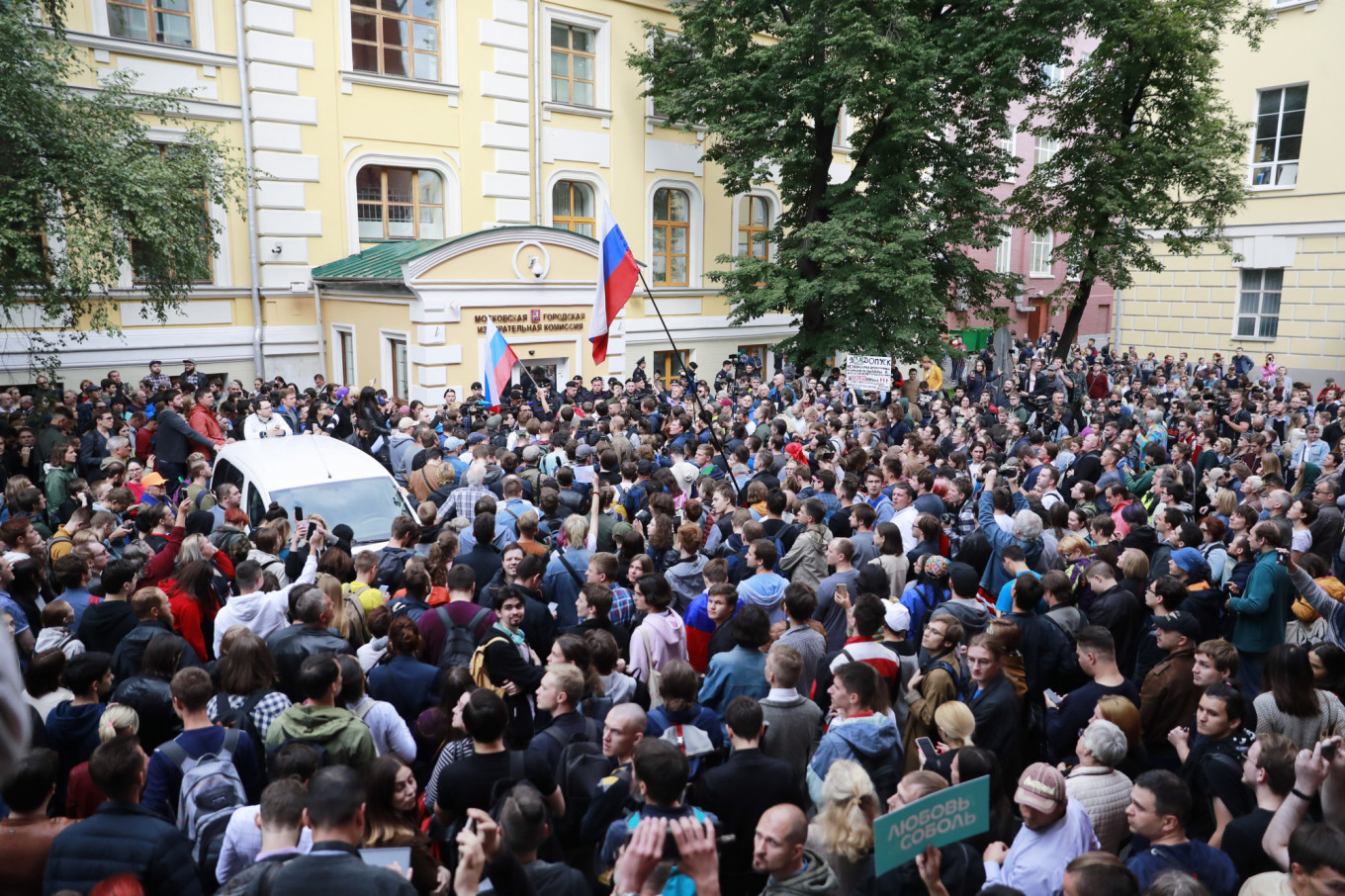One by one, opposition politicians who say the authorities are trying to remove them from the ballot for elections to Moscow’s city legislature this September climbed onto a ledge on City Hall Sunday afternoon and addressed around 2,000 protestors who had gathered to support them.
The protest was the latest in a rising tide of civil unrest across Russia sparked by dissatisfaction over declining living standards that has led to falling ratings for Russian President Vladimir Putin and the ruling United Russia party. The organizers have called for another demonstration on Monday evening.
“We demand that the opposition be included in these elections and that citizens be given the right to a real vote and an alternative,” opposition candidate Ilya Yashin yelled from the ledge to a roar from the crowd in central Moscow.
Potential candidates for the 45-seat Moscow City Duma each had to collect around 5,000 signatures from city residents. But over the past week, opposition politicians have seen some of the names they collected invalidated by the election commission, and they expect to be removed from the ballot when the count is finished.
According to the police monitoring group OVD Info, at least 38 people were detained, including Yashin and opposition leader Alexei Navalny allies Lyubov Sobol and Ivan Zhdanov.
 Police detained at least 38 outside Moscow’s election commission building on Sunday evening. Sergei Fadeichev / TASS
Police detained at least 38 outside Moscow’s election commission building on Sunday evening. Sergei Fadeichev / TASSYashin, who is currently a municipal deputy, said Friday that he has already had 11.4% of his collected signatures invalidated for “technical reasons” and is sure his name will be kept off the ballot. Last month, the independent Levada Center pollster found that he would win if allowed to run.
“The last elections came several months after Crimea was annexed and the euphoria that followed,” said Ilya Azar, a municipal deputy and a political journalist for the independent Novaya Gazeta newspaper, who has been organizing daily single-person pickets outside Moscow’s election commission building demanding the registration of opposition candidates for the past week. “Liberals were shocked and unsure about what they could do.”
This time around, however, Azar sees civil society waking up. Just last month, mass protests he organized helped free investigative journalist Ivan Golunov who had been arrested on what appeared to be fabricated drug charges. On Sunday, protesters told The Moscow Times that the collective mood gives them hope that opposition candidates will make it onto the ballot.
The usually fractured opposition appeared to come together on Sunday to that end. In total, 17 opposition candidates signed their names as co-organizers to a Facebook event promoting the protest.
Even before they began reporting invalidations of the signatures they had collected, the hopefuls for Russia’s September city Duma elections have faced obstacles. Some had so-called “clones” included in their neighborhoods — candidates with similar names and appearances. Others have caught competitors forging signatures, The Sunday Times reported last month.
Sobol, who is hoping to run in the election, had feces thrown at her while she was collecting signatures with volunteers last month. On the eve of Sunday’s protest, Sobol announced a hunger strike in protest at the opposition being blocked from elections.
“My team had more than 50 people working despite all of the provocations,” she told The Moscow Times, accusing Moscow Mayor Sergei Sobyanin of keeping the opposition off the ballot. “It won’t be that easy to stop us from fighting for our rights.”
Moscow police estimated that around 1,000 protesters came out to the unauthorized demonstration. In a surprise move, police allowed the protesters to gather without mass arrests for much of the day. Just last month, they detained over 500 people at a protest in support of Golunov.
Later on Sunday Sobol and Zhdanov led protesters from City Hall to Moscow’s election commission building, just steps from the Kremlin. Along the way, the crowd chanted for Putin and Sobyanin to resign.
Police tried to block the protesters when they reached the election commission building, but the crowd pushed through and then gathered outside the closed door, demanding that the commission’s head, Valentin Gorbunov, hear their demands. Gorbunov’s representative told Yashin that Gorbunov was at his summer house outside the city for the weekend and wouldn’t meet with protesters.
But the protesters didn’t want to let up. Before police cleared them away from the building, they had posted on social media, asking for supporters to come with water, food, mats and tents so they could spend the night until Gorbunov returned.
“How can we change the Kremlin if we can’t even influence government at the local level?” said Anna Sizova, 22, a student at the Higher School of Economics. “We have to start with the local parliament first.”
